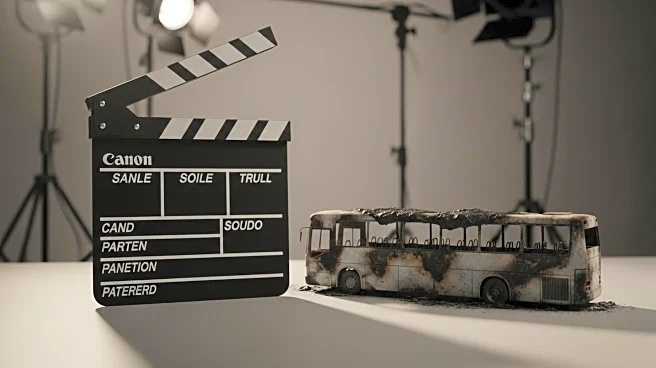What's Happening?
The creative team behind Paul Greengrass's film 'The Lost Bus' has recreated the 2018 Camp Fire, one of California's deadliest wildfires, for the movie. The film centers on the real-life heroics of school-bus driver Kevin McKay and school teacher Mary Ludwig, who saved 22 children during the disaster. Editor William Goldenberg, who worked on the film's post-production, shared his personal experience of being evacuated from his home due to a fire in Pacific Palisades, highlighting the film's realism. The sound team, led by Rachael Tate, incorporated actual radio communications from first responders during the fire, adding authenticity to the film. VFX Supervisor Charlie Noble used real-life references from the Paradise Fire Chief and schoolteacher Ludwig to accurately depict the fire's path. The film portrays the fire as a character, emphasizing its unpredictable and destructive nature.
Why It's Important?
The film 'The Lost Bus' serves as a poignant reminder of the devastating impact of wildfires, particularly in California, where such events are increasingly common due to climate change. By recreating the Camp Fire, the film not only honors the bravery of those involved but also raises awareness about the challenges faced by communities during such disasters. The use of real-life audio and visual references enhances the film's authenticity, potentially influencing public perception and policy discussions around fire safety and emergency preparedness. The film's portrayal of nature as an antagonist underscores the growing threat of environmental disasters, prompting discussions on climate action and resilience strategies.
What's Next?
The release of 'The Lost Bus' may spark further conversations about the importance of disaster preparedness and the need for improved safety measures in fire-prone areas. It could also lead to increased scrutiny of emergency response protocols and inspire other filmmakers to tackle real-world issues through cinema. As audiences engage with the film, there may be calls for more robust climate policies and community support systems to mitigate the impact of future wildfires.
Beyond the Headlines
The film's depiction of the Camp Fire highlights ethical considerations in storytelling, particularly the responsibility of filmmakers to accurately represent real-life tragedies. It also raises questions about the role of cinema in shaping public discourse on environmental issues. By preserving the voices of first responders, the film acts as a living memory, ensuring that the lessons learned from the Camp Fire are not forgotten.









